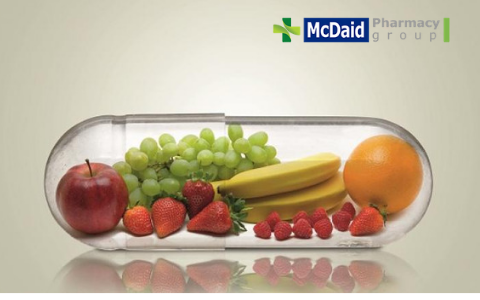Food Sources of Vitamins and Minerals
Vitamin A - Promotes good eyesight and normal functioning of the immune system.
Food sources include: Cod-liver oil, milk, eggs, sweet potatoes, carrots, leafy vegetables, and fortified foods such as breakfast cereals
Vitamin B1 (Thiamine) - Helps the body process carbohydrates and some protein.
Food sources include: Beans and enriched, fortified, or whole-grain products such as bread, pasta, and cereals
Vitamin B2 (Riboflavin) - Supports many body processes such as turning food into energy. It also helps your body make red blood cells.
Food sources include: Milk, breads, fortified cereals, almonds, asparagus, dark meat chicken, and cooked beef
Vitamin B3 (Niacin) - Helps with digestion and changing food into energy; helps make cholesterol.
Food sources include: Poultry, fish, meat, whole grains, and fortified cereals
Vitamin B6 - Supports your nervous system. Helps the body break down proteins. Helps the body break down stored sugar.
Food sources include: Fortified cereals, fortified soy-based meat substitutes, baked potatoes with skin, bananas, light-meat chicken and turkey, eggs, peas, and spinach
Vitamin B12 - Helps with cell division and helps make red blood cells.
Food sources include: Beef, clams, mussels, crabs, salmon, poultry, soybeans, and fortified foods
Vitamin C (Ascorbic Acid) - Promotes a healthy immune system and helps make collagen. It’s also needed to make certain chemical messengers in the brain.
Food sources include: Citrus fruits, berries, tomatoes, potatoes, broccoli, cauliflower, Brussels sprouts, red and green bell peppers, cabbage, and spinach
Vitamin D - Maintains bone health and helps the body process calcium; important for immune system function; may protect from cancer.
Food sources include: Fortified milk, cheese, and cereals; egg yolks; salmon, cod liver oil
Vitamin E - As an antioxidant, it helps protect cells from damage.
Food sources include: Leafy green vegetables, almonds, hazelnuts, and vegetable oils like sunflower, canola, and soybean
Folate (Folic Acid) - Promotes cell development, prevents birth defects, promotes heart health, and helps red blood cells form.
Food sources include: Fortified cereals and grain products; lima, lentil, kidney, and garbanzo beans; and dark leafy vegetables
Vitamin K - Helps blood clot and maintains bone health.
Food sources include: Leafy green vegetables like parsley, chard, and kale; broccoli, Brussels sprouts, and cabbage; and fruits such as avocado. Kiwi and grapes
Calcium - Helps build and maintain strong bones and teeth. Helps muscles work. Supports cell communication.
Food sources include: Dairy products, broccoli, dark leafy greens like spinach and rhubarb, and fortified products, such as orange juice, soy milk, and tofu
Chromium - Helps maintain normal blood sugar (glucose) levels by reducing sugar cravings
Food sources include: Some cereals, beef, turkey, fish, broccoli, and grape juice
Copper - Helps break down iron and helps make red blood cells, and helps produce energy for cells. It also helps maintain bones, connective tissue, and blood vessels.
Food sources include: Organ meats (like liver), seafood, cashews, sunflower seeds, wheat bran cereals, whole-grain products, avocados, and cocoa products
Fluoride - Prevents dental cavities and stimulates new bone formation.
Food sources: Fluoridated water, teas, and some fish
Iodine - Works to make thyroid hormones.
Food sources include: Iodized salt, some seafood, kelp, and seaweed
Iron - Carries oxygen to all parts of the body through red blood cells.
Food sources include: Leafy green vegetables, beans, shellfish, red meat, eggs, poultry, soy foods, and some fortified foods
Care! Too much iron can cause constipation!
Magnesium - Helps muscles and nerves work, steadies heart rhythm, maintains bone strength, and helps the body create energy, good for muscle pain
Food sources include: Whole grains, leafy green vegetables, almonds, Brazil nuts, soybeans, halibut, peanuts, hazelnuts, lima beans, black-eyed peas, avocados, bananas,
Manganese - Supports bone formation and wound healing, and also helps break down proteins, cholesterol, and carbohydrates. It’s also an antioxidant.
Food sources include: Milk, eggs, cereal, date palm, corn flour, carob flour, scallops, mussels, and leafy and non-leafy vegetables, pecans, almonds, green and black tea, whole grains, and pineapple juice
Molybdenum - Helps process proteins and other substances.
Food sources include: Legumes, grain products, and nuts
Phosphorus - Helps cells work helps the body make energy, helps red blood cells deliver oxygen, and helps make bone.
Food sources include: Dairy products, beef, chicken, halibut, salmon, eggs, and whole wheat breads
Potassium - Helps the nervous system and muscles; helps maintain a healthy balance of water.
Food sources include: Broccoli, potatoes with the skin, prune juice, orange juice, leafy green vegetables, bananas, raisins, and tomatoes
Selenium - Helps protect cells from damage and regulates thyroid hormone.
Food sources include: Organ meats (like liver), shrimp, crabs, salmon, halibut, and Brazil nuts
Zinc - Supports immune function, as well as the reproductive and nervous systems.
Food sources include: Red meat, fortified cereals, oysters, almonds, peanuts, chickpeas, soy foods, and dairy products
Remember if you cannot adjust your diet to suit your vitamin needs, then we can supply you with vitamin supplements to help with this, just click here.


